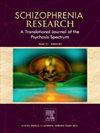The relationship between age of onset, peripheral plasma protein markers and social cognition in first-episode drug-naïve schizophrenia
IF 3.5
2区 医学
Q1 PSYCHIATRY
引用次数: 0
Abstract
Background
The relationship between age of onset and social cognition in schizophrenia (SCZ), as well as the role of peripheral plasma protein markers in this connection, remains unclear. This study aims to investigate these associations in first-episode drug-naïve SCZ.
Methods
A total of 171 SCZ patients were enrolled and categorized into non-late-onset and late-onset groups based on their age of onset, which was recorded at enrollment. Social cognition was evaluated using the MATRICS Consensus Cognitive Battery (MCCB). The expression levels of HLA-DPB1 (human leukocyte antigen-DPβ1), KRT4 (keratin 4), and NOTCH4 (NOTCH homologous protein 4) were measured via enzyme-linked immunosorbent assay (ELISA). Their relationships were analyzed using partial correlation analysis and mediation effects model.
Results
Late-onset SCZ patients had better social cognition than non-late-onset patients (P < 0.05). Age of onset was positively correlated with social cognition in both groups (P < 0.05). In the non-late-onset group, KRT4 and NOTCH4 were associated with social cognition, and in the late-onset group, only KRT4 was linked to social cognitive performance (P < 0.05). Notably, age of onset was found to correlate with NOTCH4 expression in both groups (P < 0.05). Additionally, mediation analysis revealed that in the non-late-onset group, the relationship between age of onset and social cognition was mediated by NOTCH4 (P < 0.05).
Conclusion
Our study revealed a positive correlation between age of onset and social cognition, in which NOTCH4 may play a mediating role, especially in the non-late onset group of SCZ patients.
首发精神分裂症患者发病年龄、外周血蛋白标志物与社会认知的关系drug-naïve
发病年龄与精神分裂症(SCZ)患者社会认知之间的关系以及外周血浆蛋白标志物在这方面的作用尚不清楚。本研究旨在探讨这些关联在首发drug-naïve SCZ。方法171例SCZ患者入组,根据发病年龄分为非晚发性组和晚发性组。社会认知使用矩阵共识认知电池(MCCB)进行评估。酶联免疫吸附法(ELISA)检测HLA-DPB1(人白细胞抗原- dpβ 1)、KRT4(角蛋白4)、NOTCH4 (NOTCH同源蛋白4)的表达水平。采用偏相关分析和中介效应模型对二者的关系进行分析。结果迟发性SCZ患者的社会认知能力优于非迟发性SCZ患者(P < 0.05)。两组患者发病年龄与社会认知呈正相关(P < 0.05)。在非晚发组中,KRT4和NOTCH4与社会认知相关,在晚发组中,只有KRT4与社会认知表现相关(P < 0.05)。值得注意的是,两组患者的发病年龄与NOTCH4表达相关(P < 0.05)。此外,中介分析显示,在非晚发组中,NOTCH4介导了发病年龄与社会认知的关系(P < 0.05)。结论发病年龄与社会认知呈正相关,NOTCH4可能在其中起中介作用,尤其是在非晚发SCZ患者中。
本文章由计算机程序翻译,如有差异,请以英文原文为准。
求助全文
约1分钟内获得全文
求助全文
来源期刊

Schizophrenia Research
医学-精神病学
CiteScore
7.50
自引率
8.90%
发文量
429
审稿时长
10.2 weeks
期刊介绍:
As official journal of the Schizophrenia International Research Society (SIRS) Schizophrenia Research is THE journal of choice for international researchers and clinicians to share their work with the global schizophrenia research community. More than 6000 institutes have online or print (or both) access to this journal - the largest specialist journal in the field, with the largest readership!
Schizophrenia Research''s time to first decision is as fast as 6 weeks and its publishing speed is as fast as 4 weeks until online publication (corrected proof/Article in Press) after acceptance and 14 weeks from acceptance until publication in a printed issue.
The journal publishes novel papers that really contribute to understanding the biology and treatment of schizophrenic disorders; Schizophrenia Research brings together biological, clinical and psychological research in order to stimulate the synthesis of findings from all disciplines involved in improving patient outcomes in schizophrenia.
 求助内容:
求助内容: 应助结果提醒方式:
应助结果提醒方式:


